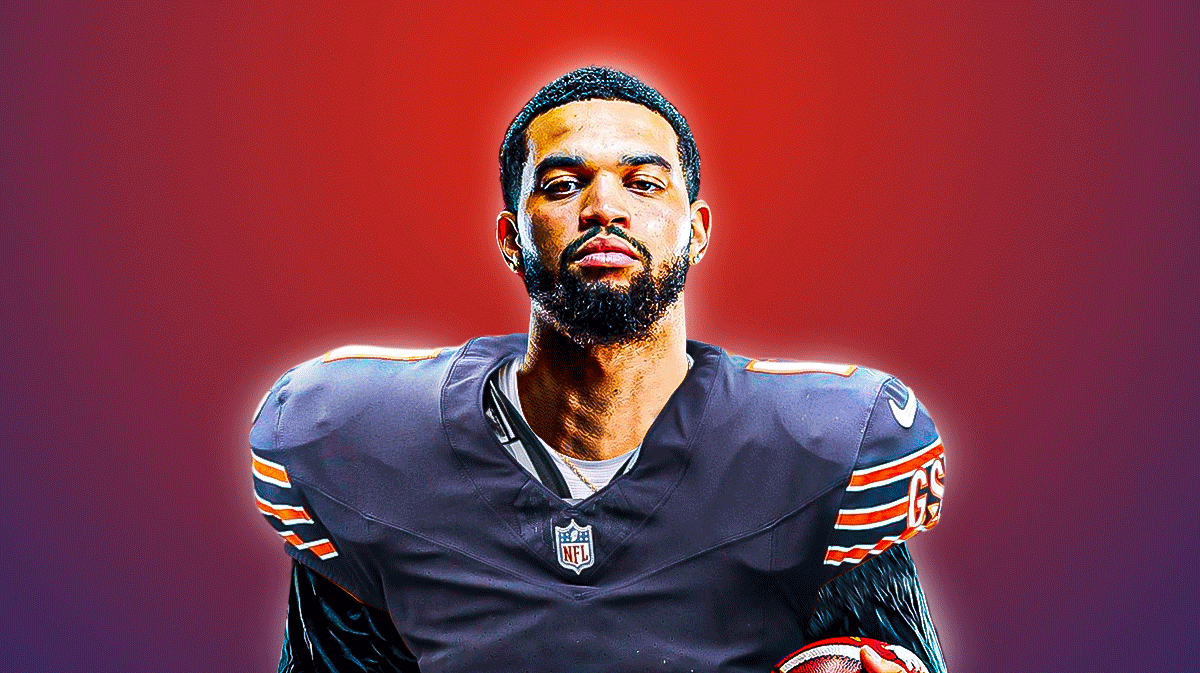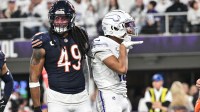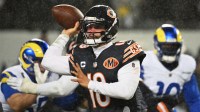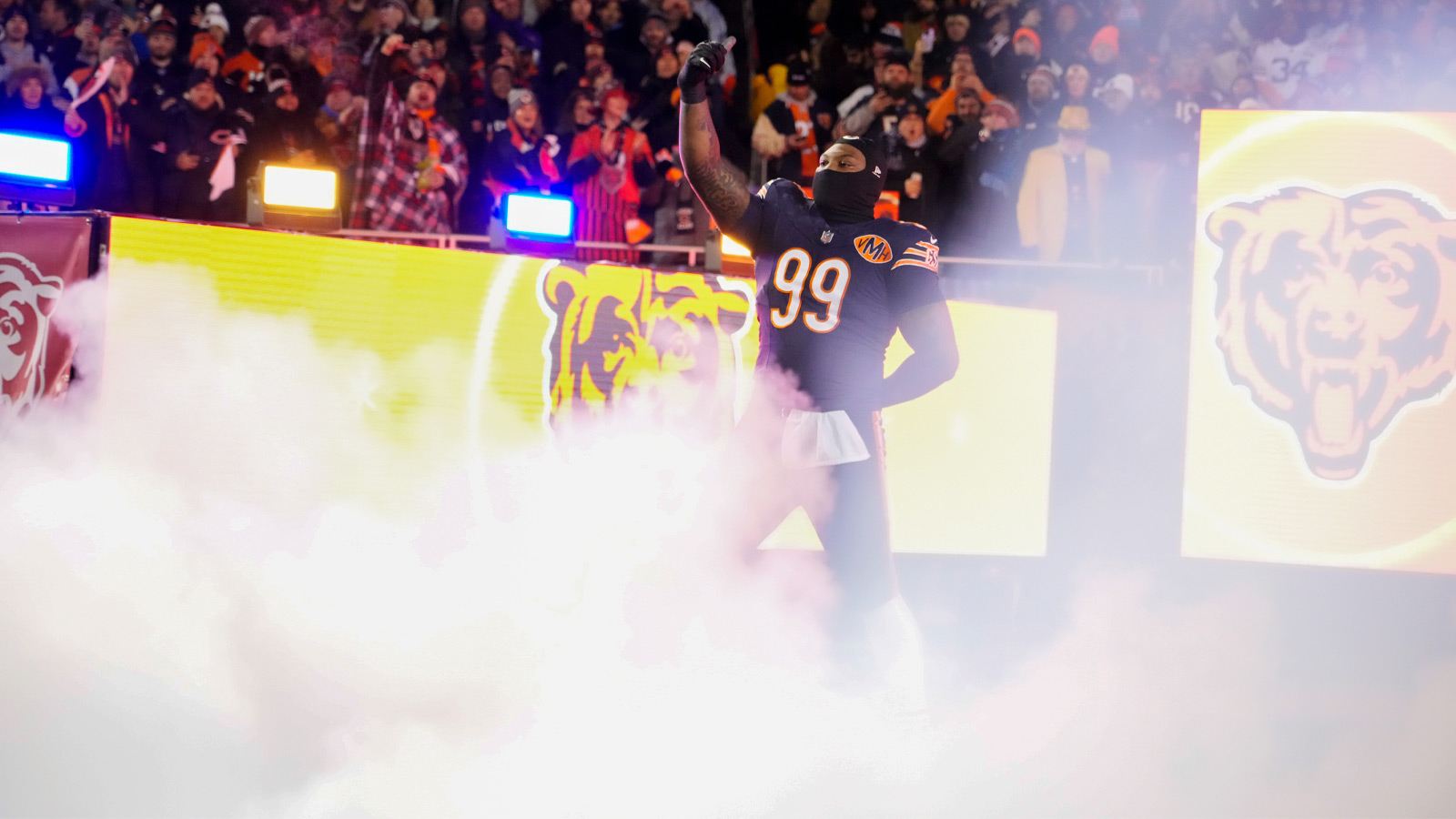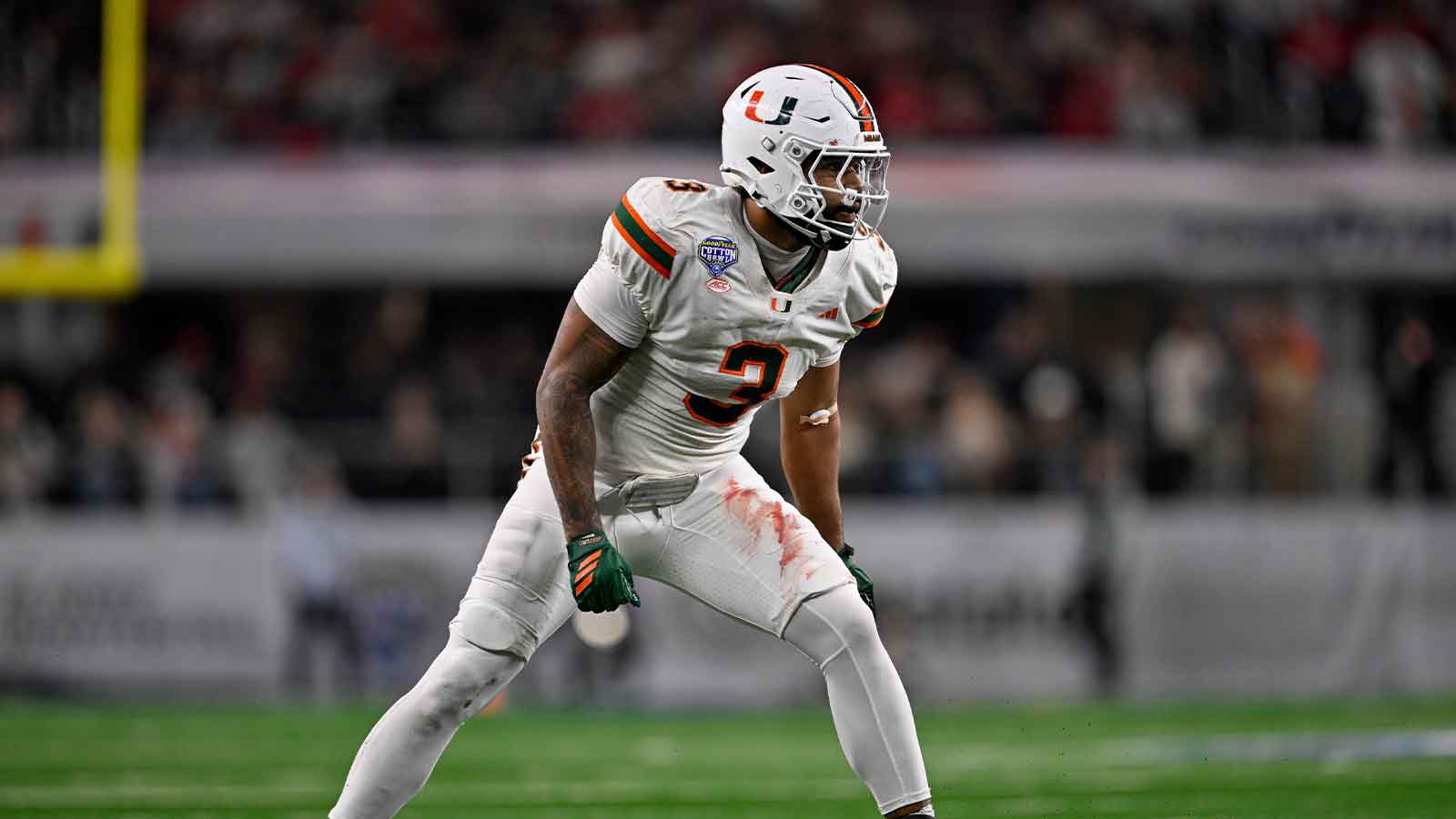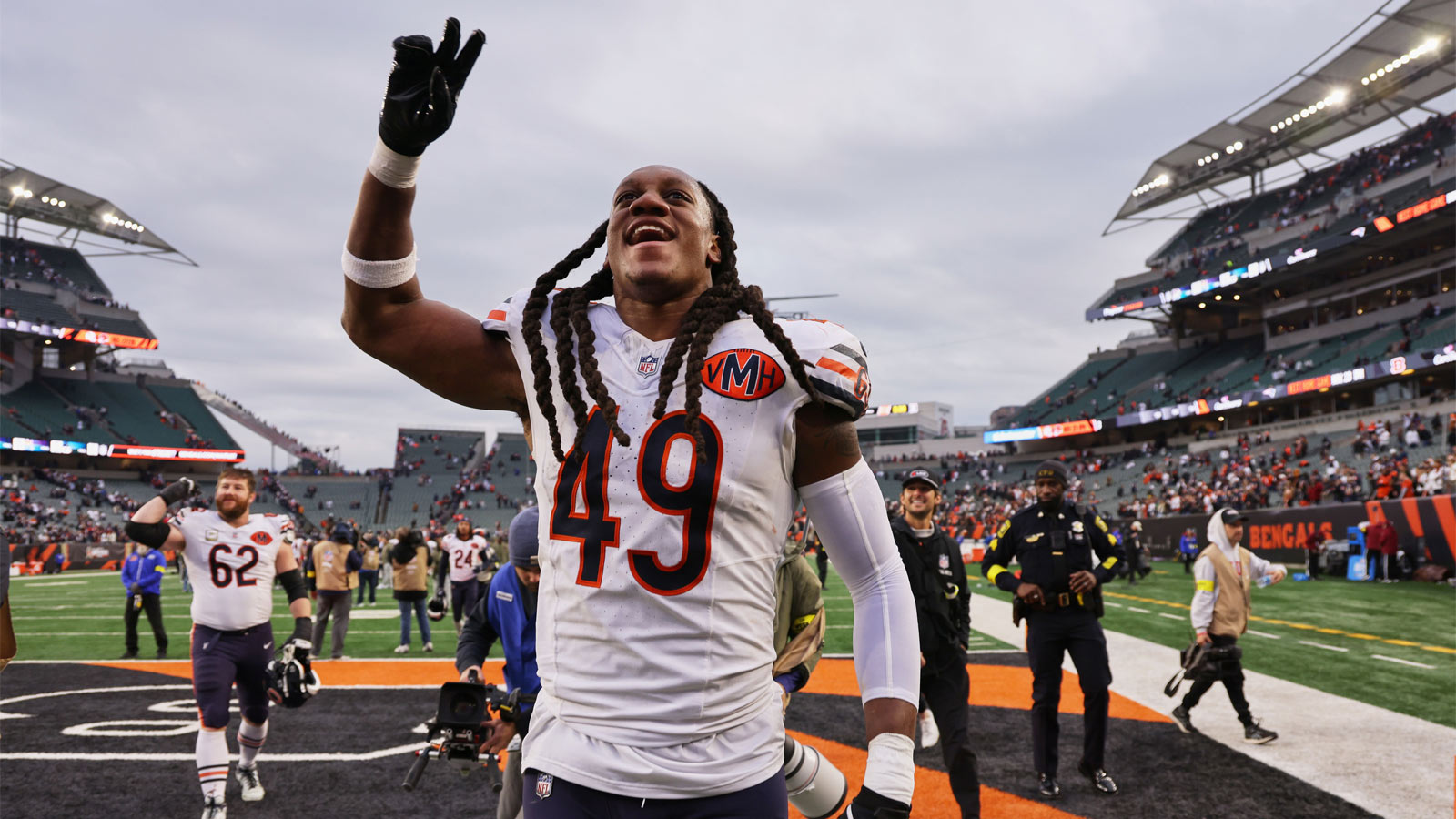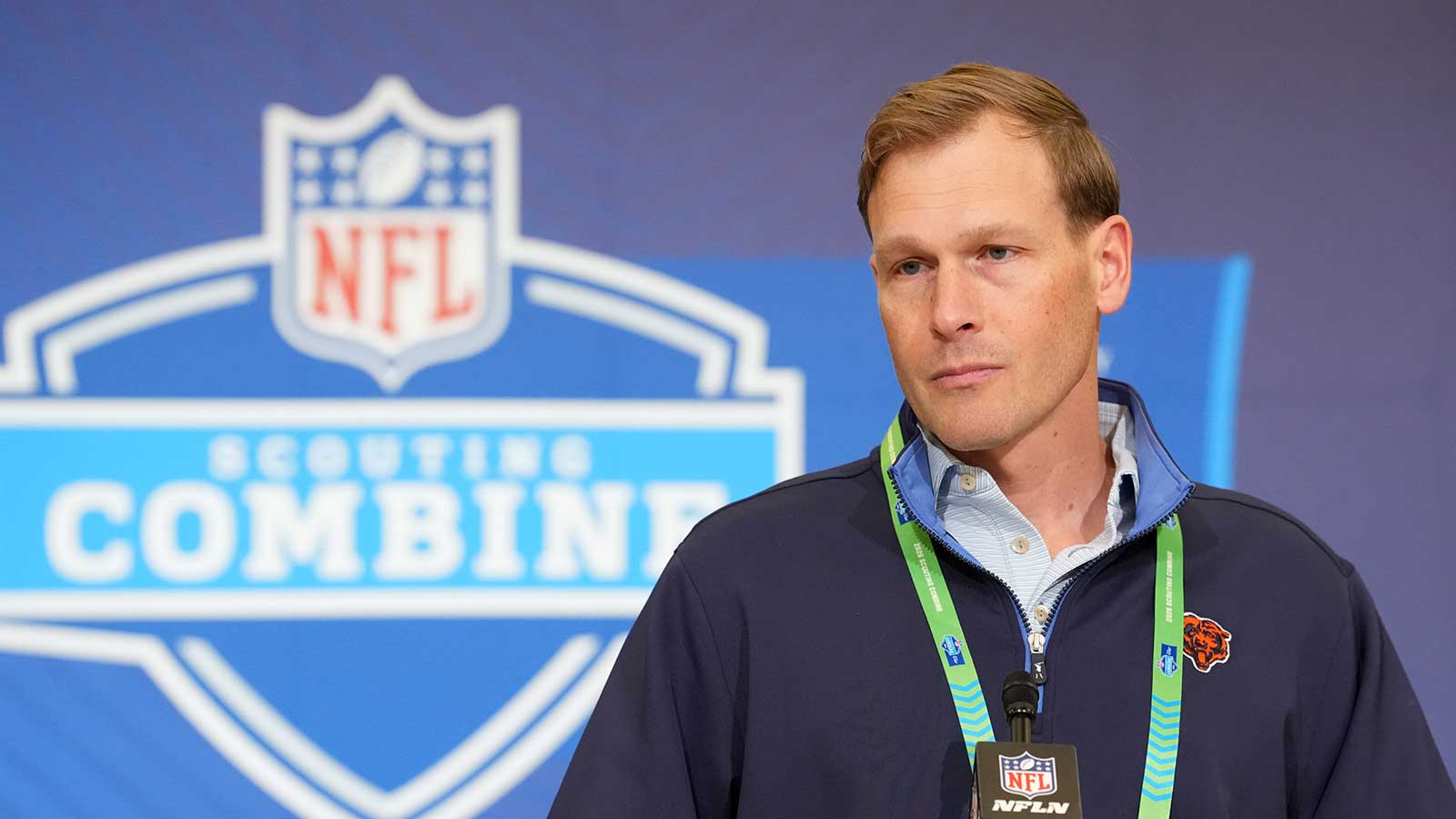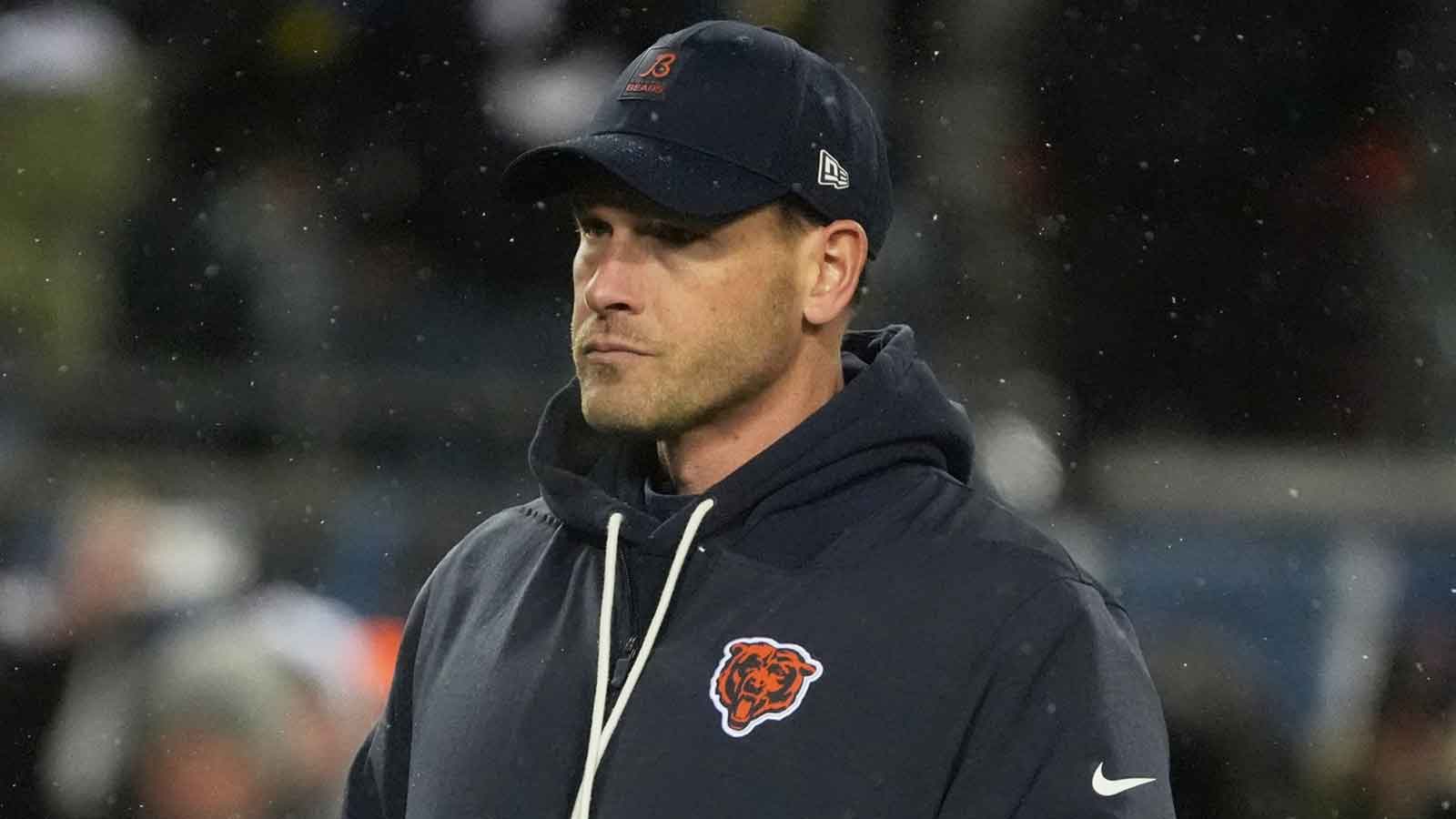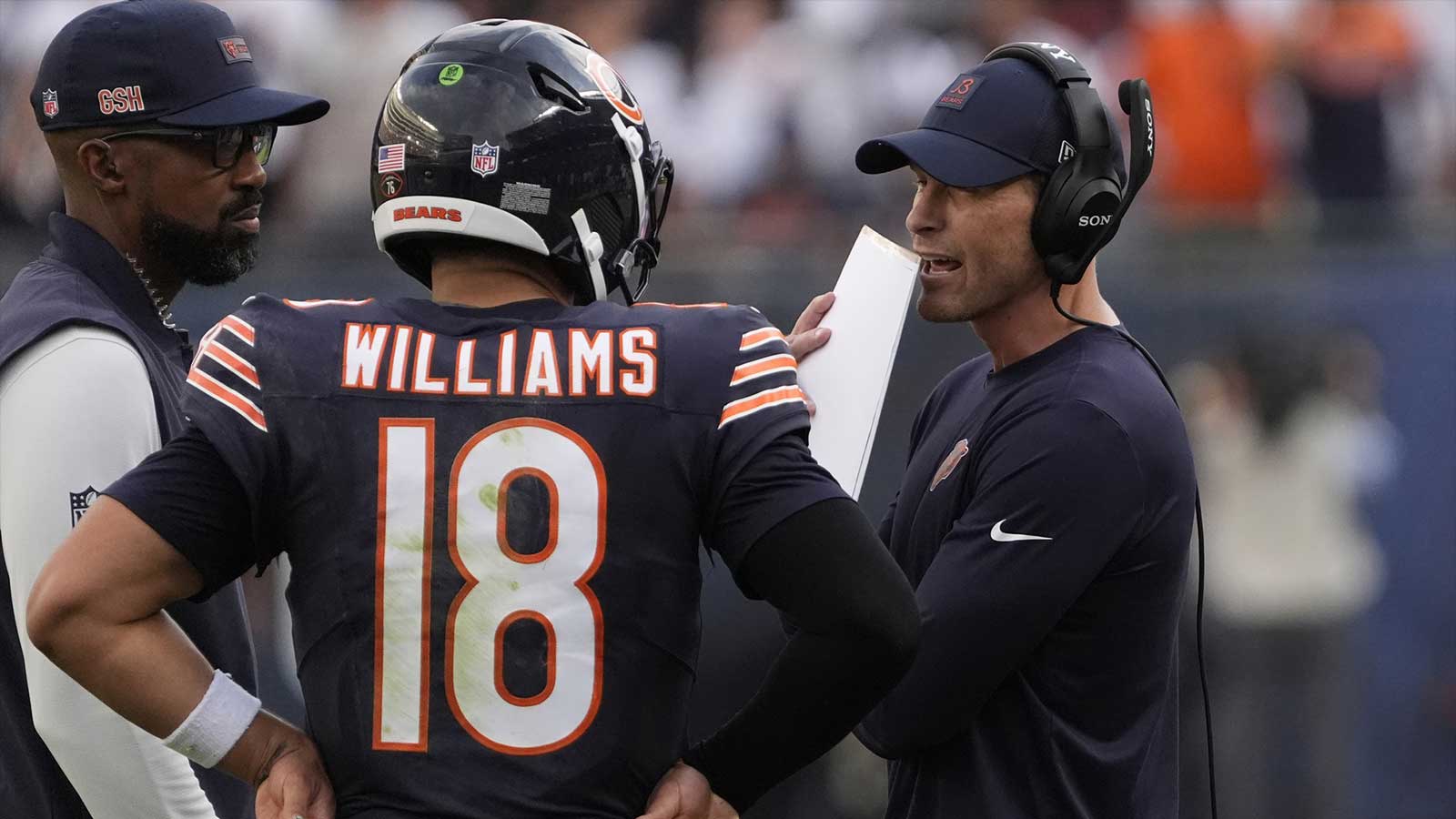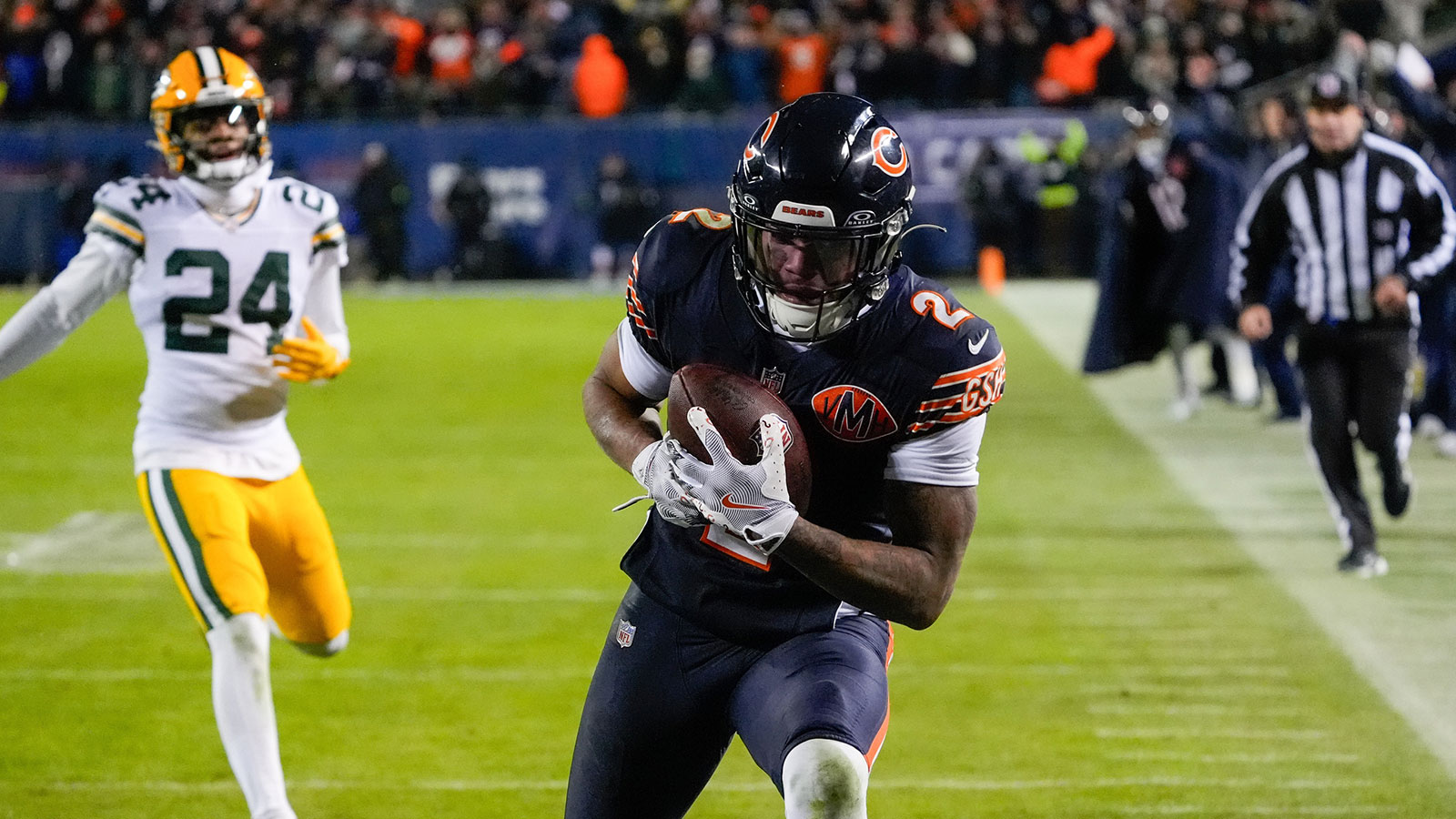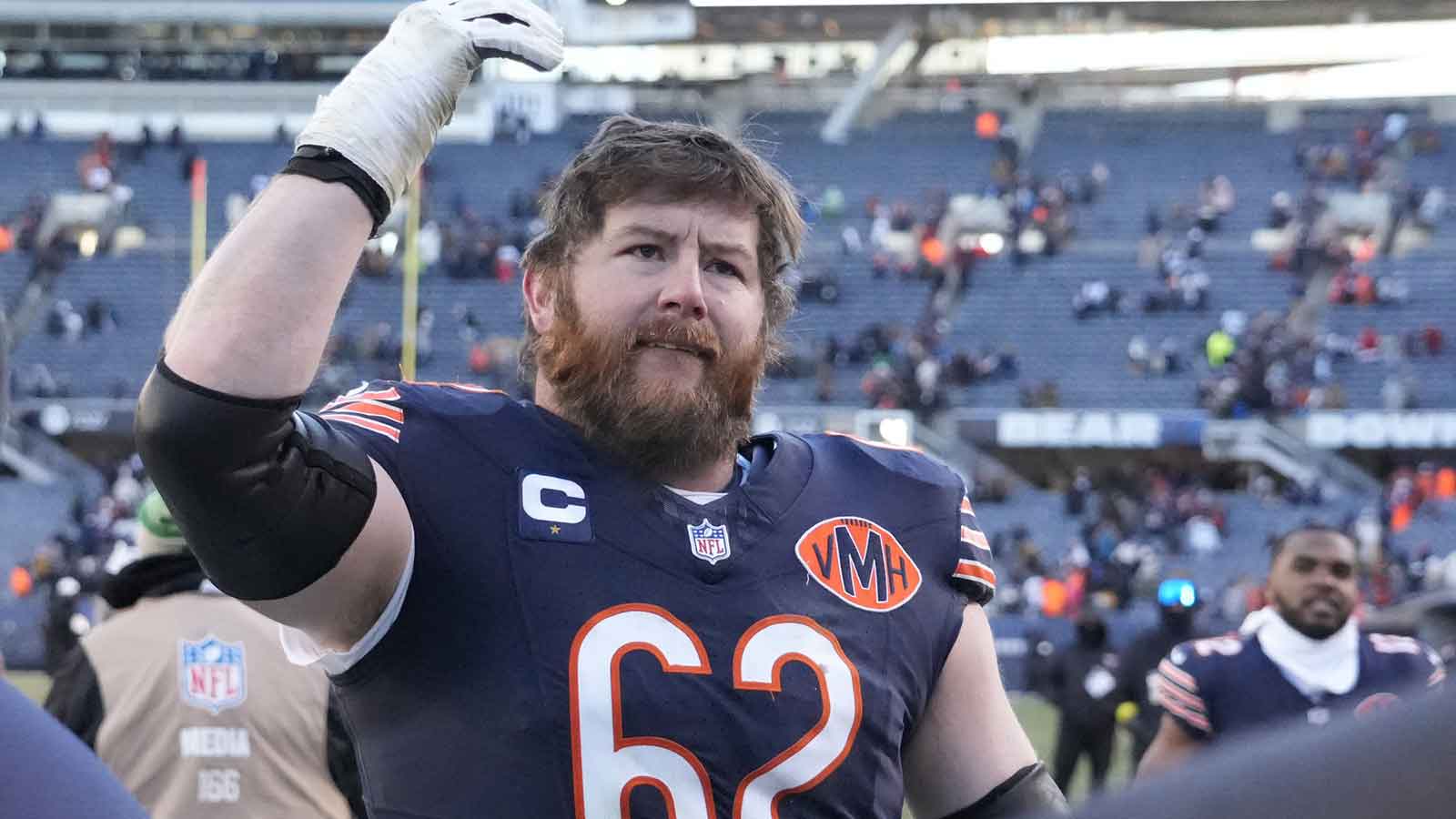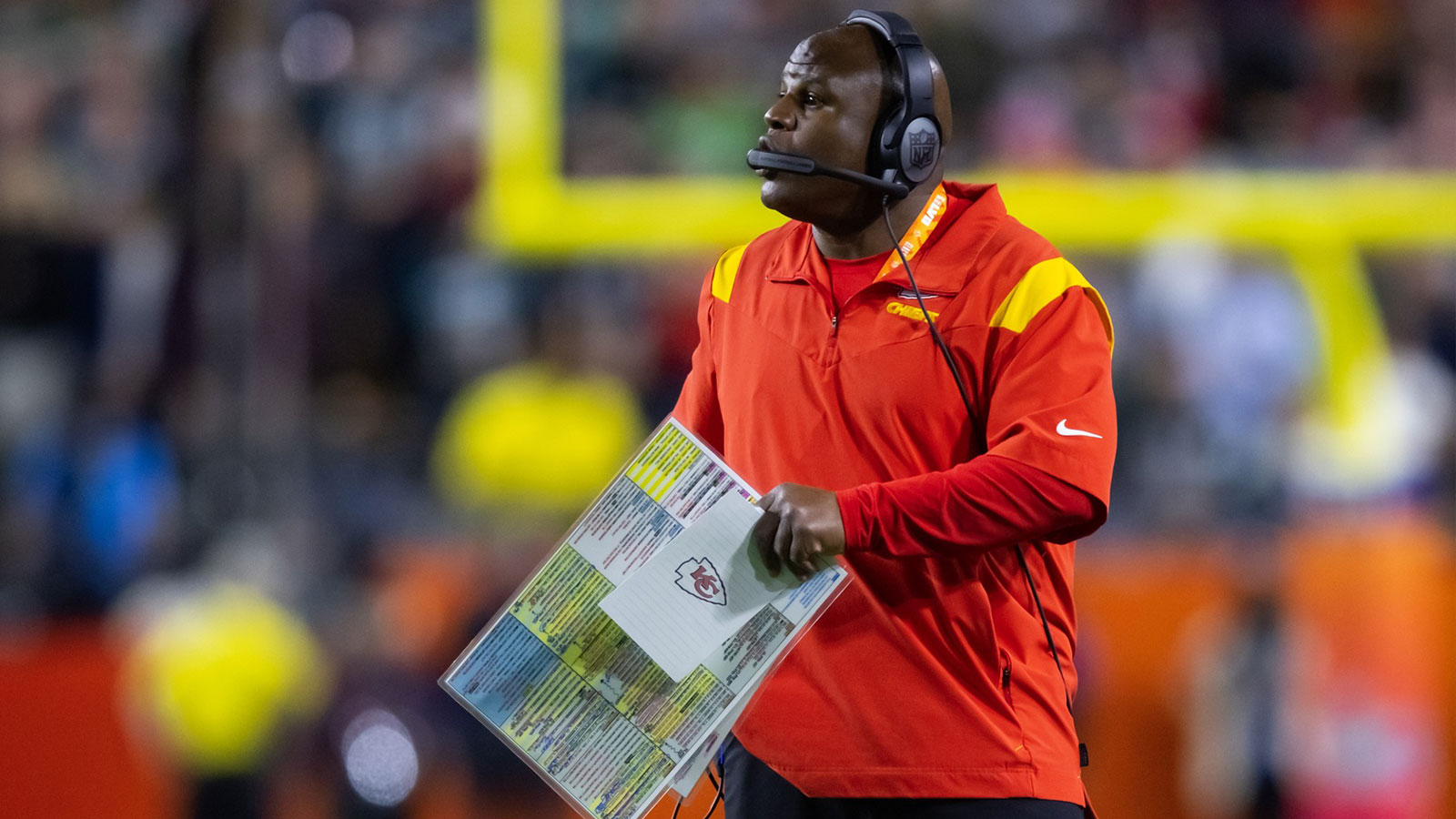In 25 days, the Chicago Bears will likely use the #1 pick in the NFL Draft to select USC quarterback Caleb Williams. For longtime fans of the Bears, myself included, the idea of selecting a quarterback who is widely considered to be a generational prospect feels a little bit like an April Fools Day joke. Something like this is simply too good to be true, because what the history of the Chicago Bears tells us is that we have been and will forever be in the hunt for a star at the game's most important position.
So what you'll be reading today is a more-thorough-than-necessary breakdown of the 29 quarterbacks who have started a game for the Bears in the last 25 years. I used 25 years as the cutoff for two reasons:
1) Focusing on anything more than a quarter-century of misery seemed excessively cruel. Almost like something that a Packers or Vikings fan would write just to have a good laugh at the expense of Bears fans.
2) As a 32 year old, my memory as a Bears fan begins as a 7 year old, and I didn't want to write about any quarterback that pre-dated my memory.
While some of the names on this list may seem like a joke, and while it has certainly felt like we Bears fans are living in some sort of hellish Every Day is April Fools Day alternate reality, all of this information is factual and true. I lived through it, and many of the folks who will spend the time to read this entire thing lived through it too. So without further ado, this is the Chicago Bears Quarterback Rundown.
Category A – Wait, Who Is That Again?
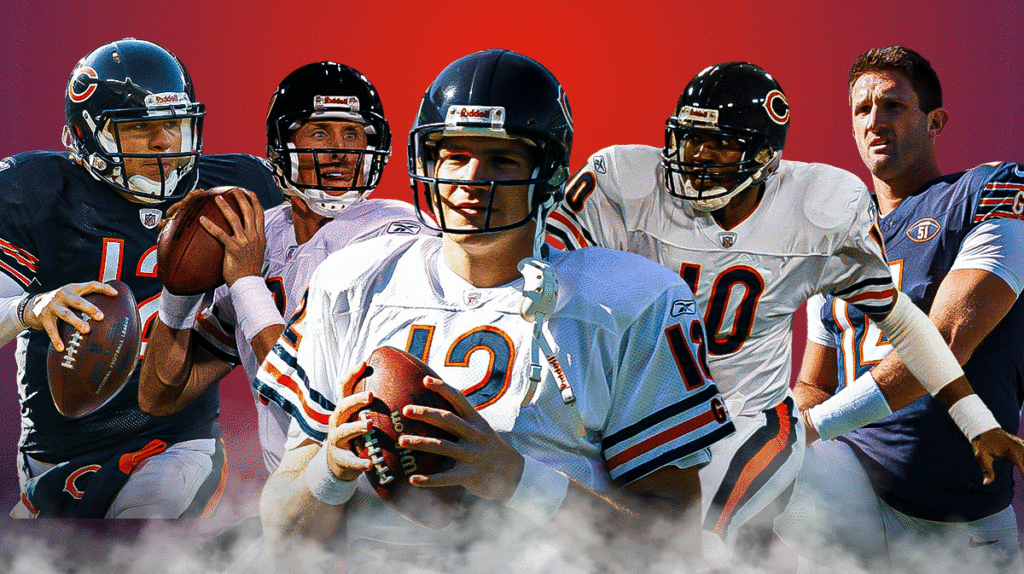
Henry Burris – 2002, 6 games, 207 passing yards (74th all-time in Bears history), 3 touchdowns, 5 interceptions, 0-1 record as starter
We'll kick things off with arguably the greatest quarterback in the history of the league… the Canadian Football League, that is. Henry Burris is the third leading passer in the history of the CFL, and was inducted into the Canadian Football Hall of Fame after an illustrious career that included two CFL MVP awards and three Grey Cup championships (that's the Canadian version of the Super Bowl). Burris' one start for the Bears came as a detour in the middle of his CFL career, and he didn't do nearly as well in Chicago. Burris completed just 7 of 19 attempts for 78 yards and 4 interceptions in a 15-0 loss. In his defense, it was against a Tampa Bay Buccaneers defense that would go on to humble league MVP Rich Gannon and the Oakland Raiders in the Super Bowl just a month later.
Jonathan Quinn – 2004, 5 games, 413 passing yards (61st all-time), 1 touchdown, 3 interceptions, 0-3 record as starter
We'll follow up Henry Burris with arguably the greatest quarterback in the history of the NFL… NFL Europe, that is. Jonathan Quinn led the league (again, NFL Europe) in passing yards in 2001 and was named the World Bowl MVP as a member of the Berlin Thunder. Much like Burris, Quinn's first start came against the team that would go on to represent the NFC in the Super Bowl that year. Against a Philadelphia Eagles defense that allowed just 16 passing touchdowns to 17 interceptions during the regular season, Quinn made an impressive NFL debut, completing 26 of 43 passes for 215 yards and a touchdown. This 19-9 loss turned out to be the highlight of Jonathan Quinn's career as a starter… you know, except for all of the wild success he had while playing in Berlin.
Chad Hutchinson – 2004, 5 games, 903 passing yards (47th all-time), 4 touchdowns, 3 interceptions, 1-4 record as starter
You could say that John Elway walked so that Chad Hutchinson could stumble. Hutchinson was once a two-sport star at Stanford, leading the football team to a victory in the Sun Bowl in 1996, and the baseball team to the College World Series in 1997. Hutchinson would spend four and a half years playing Minor League Baseball for St. Louis Cardinals affiliates before coming to the NFL, first with the Dallas Cowboys and then the Bears.
Hutchinson was one of four quarterbacks to get a start for the Bears during the 2004 season, and you can actually make the case that he was the best option of the four. Yes, his 1-4 record as the starter was uninspiring to say the least, but he was the only one of the four quarterbacks who had a positive touchdown to interception ratio on the season. It was a promising enough sample size that Hutchinson, with Rex Grossman already ruled out for the year before the 2005 season began, was initially named the Bears starter during training camp, but he was beat out for the starting job by rookie Kyle Orton, and promptly released before the season began.
Nathan Peterman – 2022-2023, 5 games, 139 passing yards (80th all-time), 1 touchdown, 1 interception, 0-1 record as starter
It's easy to deduce that a new regime took over in Chicago ahead of the 2022 season, because if Matt Nagy and Ryan Pace had still been around — and for clarification, I'm thankful that they weren't — I have to imagine there's no way Peterman would've been signed after his disastrous 3-interception performance versus the Bears as the starter for the Buffalo Bills in 2018. On that Sunday afternoon in Buffalo, Nathan Peterman performed like a very, very serviceable high school quarterback. He was only slightly better in five appearances with the Bears.
Category B – The College Pedigree All-Stars
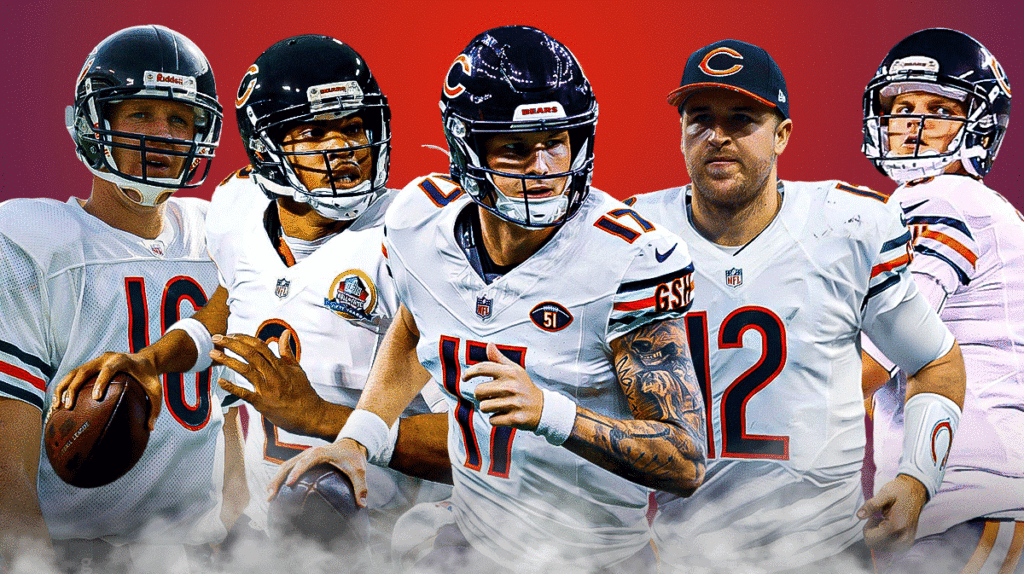
Craig Krenzel – 2004, 6 games, 718 passing yards (52nd all-time), 3 touchdowns, 6 interceptions, 3-2 record as starter
A year after winning the National Championship with Ohio State in 2003, Craig Krenzel was a 5th round selection in the 2004 NFL Draft. What ensued was a brief and somewhat surprising career arc: As a rookie, Krenzel was the only one of four quarterbacks who started a game for the Bears in 2004 who had a winning record, and yes, a miserable 3-to-6 touchdown to interception ratio indicates that the Bears were winning in spite of Krenzel. But even still, one would assume that this sliver of success would've been enough keep Krenzel on the roster at the very least. The Bears had other plans.
A season-ending ankle injury during a Thanksgiving game against the Dallas Cowboys ended Krenzel's rookie season, and before the 2005 season began, the Bears cut him… because clearly Rex Grossman and rookie Kyle Orton were more than ready to hold down the fort. Krenzel's last pass attempt with the Bears — a completion to Anthony “A-Train” Thomas for nine yards — was the final attempt he would have in an NFL regular season game.
Jason Campbell – 2012, 6 games, 265 passing yards (70th all-time), 2 touchdowns, 2 interceptions, 0-1 record as starter
A former SEC Offensive Player of the Year and Sugar Bowl MVP, Jason Campbell came to Chicago with a 31-39 record as a starter in Washington and Oakland and a perfectly fine 74-to-50 touchdown to interception ratio to be Jay Cutler's backup during the 2012 season. Filling in for an injured Cutler, Campbell made his lone start against the San Francisco 49ers and former Bears quarterback Jim Harbaugh, who was in his second season coaching the Niners.
What's funny is, I distinctly remember being thirteen years old and hoping that the Bears would be able to select Campbell with their 2nd round pick. Washington took that option off the table when they selected Campbell with the 25th pick in the draft… just one pick behind Aaron Rodgers.
Jimmy Clausen – 2014-2015, 6 games, 407 passing yards (63rd all-time), 2 touchdowns, 2 interceptions, 0-2 record as starter
When he was a junior in high school, Jimmy Clausen was the subject of a feature story in Sports Illustrated, complete with the headline, “The Kid with The Golden Arm.” Within the piece, written by Kelli Anderson of Sports Illustrated, Clausen was described as having, “the arm of John Elway, the composure of Tom Brady and the quick release of Joe Namath.” That's a lot to put on the shoulders of anybody, let alone a sixteen year old.
Like so many, Jimmy Clausen peaked in high school, and by the time he got to Chicago, he was a beaten down and battered former prodigy who was on his way out of the NFL. Clausen went 1-9 as a rookie with the Panthers, reportedly clashed with Steve Smith, and flamed out in spectacular fashion in Carolina. For the next three years, Clausen sat behind Cam Newton before being released, and his short-lived attempt at a career rejuvenation with the Bears lasted all of a season and a half.
Matt Barkley – 2016, 7 games, 1,611 passing yards (34th all-time), 8 touchdowns, 14 interceptions, 1-5 record as starter
Because the Bears had so much success with Jimmy Clausen — I mean, seriously, look at those numbers! — they of course had to run it back with another one of the most heralded high school quarterbacks of the century, Matt Barkley. Barkley went from prestigious Mater Dei High School to USC, and had he not suffered a separated shoulder during his final year with the Trojans, Barkley likely would've been a 1st Round draft pick. Instead, Barkley was selected in the 4th round of the NFL Draft by Philadelphia and has since played for over a third of the teams in the NFL.
Barkley's stint with Chicago was short and fruitful… fruitful if you're an opposing defensive back who was lined up across the field from Barkley, that is. Barkley threw 14 interceptions in just seven games with the Bears, but he also had three games with at least 300 yards, the second-highest mark in a single season in Chicago Bears history. And let me tell ya, I promise you'll be surprised by the QB who holds that record.
Tyson Bagent – 2023, 5 games, 859 passing yards (48th all-time), 3 touchdowns, 6 interceptions, 2-2 record as starter
Now before anyone complains about Tyson Bagent's inclusion in the College Pedigree All-Stars, technically I never specified that I was talking only about Division I college football, so hell yes, Tyson Bagent is a College Pedigree All-Star. Bagent's 17,034 passing yards and 159 touchdowns are the most in Division II history. And after his career at Shepherd University came to a close, the son of a World Champion Arm Wrestler, joined the Bears as an undrafted free agent with the hopes of earning a spot on the practice squad.
Bagent, who with his curly blonde hair bares a striking resemblance to former Bears quarterback of the 70s Bobby Douglass, became a preseason favorite of fans in Chicago, and was a third-stringer by the time the season starter. When Justin Fields went down with an injury in the middle of the season that cost him four weeks of action, Bagent stepped in and performed just as well as anyone could've hoped a rookie from D-II could've. Bagent added two rushing touchdowns to his three through the air, and the Bears played .500 football with him under center. It's expected that Bagent will serve as Chicago's backup quarterback during the 2024 season, and I couldn't be more on board with that.
Category C – The Career Backups
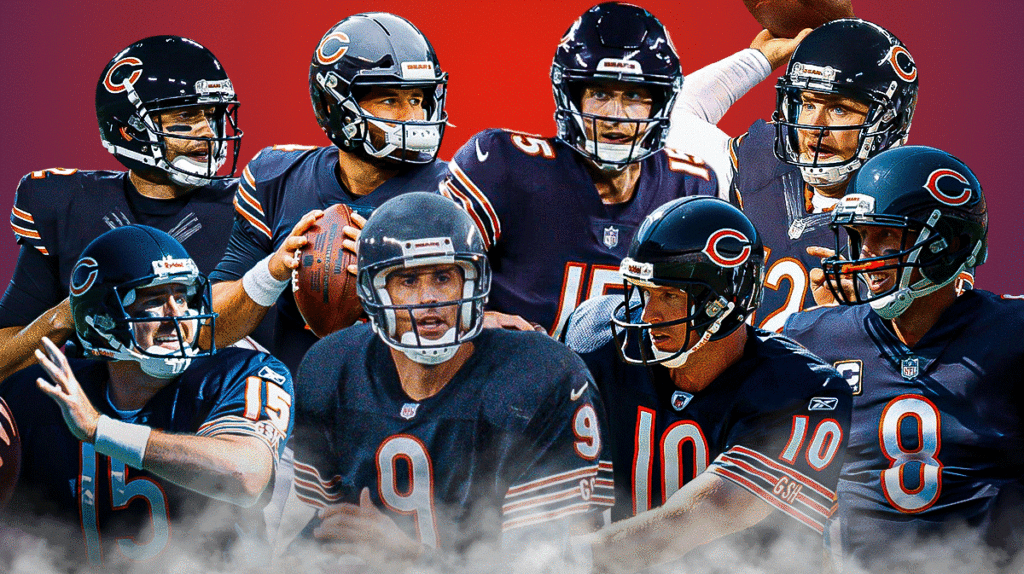
Shane Matthews – 1993-1996 / 1999-2001, 20 games, 3,461 passing yards (22nd all-time), 19 touchdowns, 18 interceptions, 8-7 record as starter
During his college career with the Florida Gators, Shane Matthews twice won the SEC Player of the Year Award and was named a 1st Team All-SEC performer three times, so I suppose he could've been included in Category B (The College Pedigree All-Stars). I don't know what to tell ya, friends. This rundown is an inexact science, just like it is for the Bears to find a successful quarterback apparently, and if you've remained a Bears fan for all of these years, surely you can put up with some indecision on my part.
Despite such an accomplished collegiate career, Shane Matthews went undrafted in 1993. He signed with the Bears as a free agent that same spring, and was a seldom-used backup in Chicago until 1996, sitting behind the likes of Jim Harbaugh, Steve Walsh, Erik Kramer, and Dave Krieg for those four seasons. Matthews then spent two years as the backup quarterback in Carolina before re-signing with the Bears ahead of the 1999 season. It was during this 1999 to 2001 stretch where he had the chance to finally get an extended look as a starter.
Look, I'm not going to sit here and pretend that Shane Matthews had been underrated ever since he was playing in Gainesville, or that the Bears should've given him more time, but the numbers don't lie. A positive touchdown to interception ratio, a winning record, and a reasonable amount of passing yards is more than most quarterbacks on this list can boast. In fact, Matthews is one of only three quarterbacks on this list of 29 who averaged over 200 yards per game, threw more touchdowns than interceptions, and had a winning record as the Bears starter.
But again, we're talking about Shane Matthews… the guy who was a decidedly worse option at starting quarterback than the next player in this category.
Jim Miller – 1999-2002, 32 games, 5,867 passing yards (17th all-time), 34 touchdowns, 26 interceptions, 15-11 record as starter
Jim Miller is another great example of a player whose category placement could be up for debate. You could make a case that Miller should be in the upcoming Category E (The Weak Links), but given the fact that Miller was a back-up for seven years who bounced around from Pittsburgh to Frankfurt (that's right, just like Jonathan Quinn, Jim Miller played in NFL Europe), to Jacksonville to Atlanta before finally getting an extended crack at starting for an '01 Bears team that surprisingly went 13-3, this feels like the appropriate place for him.
Jim Miller was the starter in the first Bears game I ever saw in person, and he started 13 games for the aforementioned '01 Bears, the first team I ever fell head over heels in love with as a young sports fan. Miller went 11-2 as the starter in 2001, and the Bears were the 2-seed in the NFC. Yes, one of the best and most opportunistic defenses in the league deserves the lion's share of the credit for securing that 1st round bye, but Miller was the exact right sort of game manager that team needed.
The city of Chicago likely remembers Hugh Douglas' late hit in the 2001 Divisional Round, but what not many people know is that Miller's separated shoulder was so damaged that it required six surgeries, and at one point doctor's considered the possibility of amputating his arm. To this day, I still believe had Miller not gotten injured (and had Shane Matthews not had to come in and provide relief, throwing two interceptions in the process) the Bears would've won that game against Philadelphia and gone on to play the Rams in the NFC Championship Game.
Todd Collins – 2010, 2 games, 68 passing yards (100th all-time), 0 touchdowns, 5 interceptions, 1-0 record as starter
In Webster's Thesaurus, there's a photo of Todd Collins next to the term “career backup.” You cannot find a better possible example. In his one and only start for the Chicago Bears, fifteen-year veteran Todd Collins — stepping in for Jay Cutler, who took an absolute beating the week prior at the hands of the New York Giants — threw four interceptions, completed only 6 of his 16 pass attempts for 32 yards, and the Bears won the game 23-6. Fittingly, the quarterback on the other side that afternoon was future Bears starter Jimmy Clausen, who went 9-for-22 for 61 yards and three interceptions. There's nothing else I even need to write.
Caleb Hanie – 2008-2011, 10 games, 679 passing yards (53rd all-time), 3 touchdowns, 10 interceptions, 0-4 record as starter
Every single Bears fan out there is all-too-familiar with the events that took place in the 2010 NFC Championship Game. And unfortunately, with the privilege of writing an in-depth editorial piece like this comes the burden of having to re-live the many painful moments that have come with being a Bears fan for the last quarter-century.
The only thing separating the Chicago Bears from their second Super Bowl appearance in five seasons was a game at Soldier Field against Aaron Rodgers and the Green Bay Packers, who only had managed to clinch a postseason berth in the first place because they had won a Week 17 game against the Bears at Lambeau Field.
The game couldn't have gotten off to a worse start. Green Bay scored on their opening drive, then extended their lead to 14-0 in the 2nd quarter, and the Bears could get absolutely nothing going on offense. Jay Cutler was picked off in the 2nd quarter and eventually knocked out of the game with what turned out to be an MCL sprain (more on that later). Backup Todd Collins was called upon first, but after four incompletions and two three-and-outs, Collins was replaced by Caleb Hanie with less than a minute to go in the 3rd quarter. Now, let's stop here for a moment:
Now at this point in time, Jay Cutler had yet to full acclimate himself to Chicago, Todd Collins was Todd Collins, and Caleb Hanie was an unknown commodity — an undrafted free agent out of Colorado State who had been the #3 quarterback on the Bears depth chart each of his first three seasons in the league. Hanie had only played in spot duty up until this point, and never once did he resemble a guy who should be taking snaps in the 4th quarter of a Playoff game against the Bears biggest rival. Yet there we were, with a Super Bowl berth on the line, and it was this guy who was supposed to lead us there?
Yes, Caleb Hanie threw a stupid interception that was returned for a touchdown by BJ Raji of all Packers players, and another to Sam Shields late in the 4th quarter that clinched the game and NFC Title for Green Bay, but he also led the Bears on two scoring drives in the 4th quarter that for just a brief second gave us a sliver of hope that a Super Bowl appearance was still within reach. And as you know by now, we don't always have much hope, especially in our quarterback.
Josh McCown – 2011-2013, 11 games, 2,243 passing yards (28th all-time), 15 touchdowns, 5 interceptions, 4-3 record as starter
Strangely, Josh McCown's record as the starter of the Chicago Bears is better than his record was while starting for the Hartford Colonials of the UFL in 2010. Must be the UFL was absolutely stacked with talent in 2010.
Brian Hoyer – 2016, 6 games, 1,145 passing yards (38th all-time), 6 touchdowns, 0 interceptions, 1-4 record as starter
In Brian Hoyer's first four starts with the Bears, he threw for 300 yards each game, tying the Bears single-season record of 300 yard games with four. That's right, Hoyer the Destroyer is in the Bears record books, despite appearing in just six games. He's even the Bears all-time leader in passing yards per game. But listen, there are much more important matters to deal with here. After perusing Hoyer's Pro-Football Reference page, I now have two burning questions:
1) Why is he so off-kilter in his photo? He's leaning so far to the right he's nearly position himself partially out of the frame. I took thirteen school photos as a kid, and not once did I look like I was tipping over.
2) Did you know that Brian Hoyer's full name is Axel Edward Brian Hoyer? Generally, I have no qualms with the name Brian, but why the hell is this man going by Brian when Axel is right there for him?
Mike Glennon – 2017, 4 games, 833 passing yards (49th all-time), 4 touchdowns, 5 interceptions, 1-3 record as starter
Did you know that the entirety of this very lengthy editorial column could be printed on Mike Glennon's neck? Hand to God, that's the truth.
Chase Daniel – 2018-2019, 8 games, 950 passing yards (46th all-time), 6 touchdowns, 4 interceptions, 1-2 record as starter
Chase Daniel started two games during Chicago's memorable and downright delightful 12-4 2018 season… the first, a win on Thanksgiving over the Detroit Lions, and his second, an overtime loss versus the New York Giants that wound up preventing the Bears from getting a 1st Round bye in the Playoffs. This means that had Daniel gone 2-0 in relief of Mitchell Trubisky in 2018, one of the worst moments of my life as a sports fan could've been avoided. More on this later.
Trevor Siemian – 2022, 2 games, 184 passing yards (76th all-time), 1 touchdown, 1 interception, 0-1 record as starter
After spending four years at Northwestern, Trevor Siemian bounced around the NFL for nearly a decade before finally returning to Chicago in 2022. This is how bad Siemian's short stint with the Bears was: Siemian was slated to get a start in relief of Justin Fields in Week 12 of the 2022 season, only he suffered an oblique injury during pregame warmups. Despite the aforementioned Nathan Peterman being named the starter right before the game, it was Siemian who made the start, losing 31-10 to the Jets. Siemian was subsequently placed on Injured Reserve and released the following offseason.
Not quite the “Homecoming” that Ye rapped about on Graduation.
Category D – The Empty Tanks
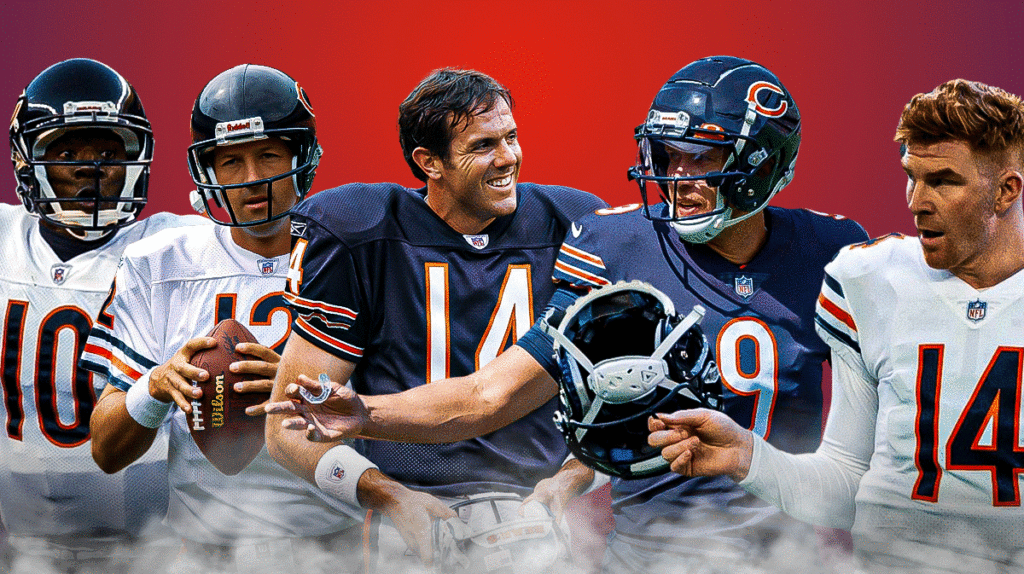
Chris Chandler – 2002-2003, 17 games, 2,073 passing yards (31st all-time), 7 touchdowns, 11 interceptions, 5-8 record as starter
Along with Ryan Fitzpatrick — who would've been maybe the fourth best quarterback in Bears history if he actually played in Chicago — Chris Chandler is one of two quarterbacks in NFL history to start for eight different teams. The problem is we got Chandler after he had already been in the league for a decade and a half. Chandler was so washed up when he played for the Bears that if he went to a dermatologist, they would've been like, “Hey Chris, ease up on the soap. You've washed yourself way too much, man.”
You want some real proof of how bad Chris Chandler was at this point in his career? In 2004, Chandler played for the Rams, and in his first start, he threw six interceptions. The next week, Chandler got another start and was so bad that after the game, Rams head coach Mike Martz told the media, “It is tragic that that position (quarterback) holds this team hostage.” Good lord that's brutal.
Kordell Stewart – 2003, 9 games, 1,418 passing yards (39th all-time), 7 touchdowns, 12 interceptions, 2-5 record as starter
Wanna know how bad Kordell Stewart was while playing for the Bears? Chicago signed Kordell Stewart as a free agent in 2003 in order to replace Chris Chandler as the starting quarterback. Had Stewart had any juice left, this move would've been a godsend, you know, because of how washed Chris Chandler was. But Kordell wasn't the guy that football fans had gotten used to seeing in Pittsburgh. In his first start for Chicago, Stewart completed 14 of 34 passes for 94 yards, with 1 touchdown and 3 interceptions in a 49-7 loss to the 49ers. Kordell would go on to start the first five games for the Bears before head coach Dick Jauron turned back to Chandler. Chandler would start the next six games before Jauron, get this, decided to give the starting job back to Kordell Stewart! And then in the end, both were sent to the bench for rookie Rex Grossman.
The Kordell Stewart/Chris Chandler quarterback competition in 2003 was like one of those videos you see of kids taking turns swinging at a piñata, only all of the little tikes are totally overmatched and unable to break the damn thing open no matter how many swings they take at it.
Brian Griese – 2006-2007, 13 games, 2,023 passing yards (32nd all-time), 11 touchdowns, 14 interceptions, 3-3 record as starter
For some inexplicable reason, the Bears signed Brian Griese to a five-year deal in 2006 to serve as the back-up to Rex Grossman. This was deeply troubling for a multitude of reasons, including the following four:
1) Brian Griese was 31 years old at the time.
2) Why the hell would you give a back-up quarterback a five-year deal?
3) Kyle Orton had just started 15 games for the Bears the season prior and the team went 10-5 in those starts. No, Kyle Orton did not have a season that Bears fans will tell their grandkids about — unless they're making jokes — but how do you demote a rookie from starter to third string in one single offseason in favor of fourth-year quarterback who had no track record of success and a 31-year-old whose best days were undoubtedly behind him?
4) If you're being signed in order to “serve as the back-up to Rex Grossman,” that's generally a sign that you probably shouldn't be on an NFL roster to begin with.
Nick Foles – 2020-2021, 10 games, 2,102 passing yards (29th all-time), 11 touchdowns, 8 interceptions, 3-5 record as starter
Nick Foles is the only “Empty Tank” quarterback who both A) Elicited a little bit of excitement from Bears fans at the time of his arrival, and B) Actually had more than one noteworthy moment while quarterbacking the team. Foles was traded to Chicago for a compensatory 4th-round pick in the 2020 NFL Draft, lost out to Mitchell Trubisky for the starting job during training camp, but was inserted into a Week 3 game against the Atlanta Falcons… a game which he threw for 188 yards and three touchdowns while leading the Bears back from a 16-point deficit.
The Nick Foles Experience peaked in Week 5 against Tom Brady and the Tampa Bay Buccaneers on Thursday Night Football. Just as was the case in Super Bowl LII, Nick Foles got the better of Tom Brady, leading the Bears to a 20-19 win over the eventual Super Bowl champions.
But again, the problem here is that the Nick Foles Experience peaked in Week 5. It's hard to tout the “Big Nick Energy” of Nick Foles when his most noteworthy win as a Bear came in October. That's an “Anatomically Average-Sized Nick Energy” performance at best.
Andy Dalton – 2021, 8 games, 1,515 passing yards (36th all-time), 8 touchdowns, 9 interceptions, 3-3 record as starter
QB1. pic.twitter.com/TuyrAcpoCM
— Chicago Bears (@ChicagoBears) March 25, 2021
Over three years later, this remains one of the most unintentionally funny tweets in the decade-and-a-half long history of Twitter.
Category E – The Weak Links
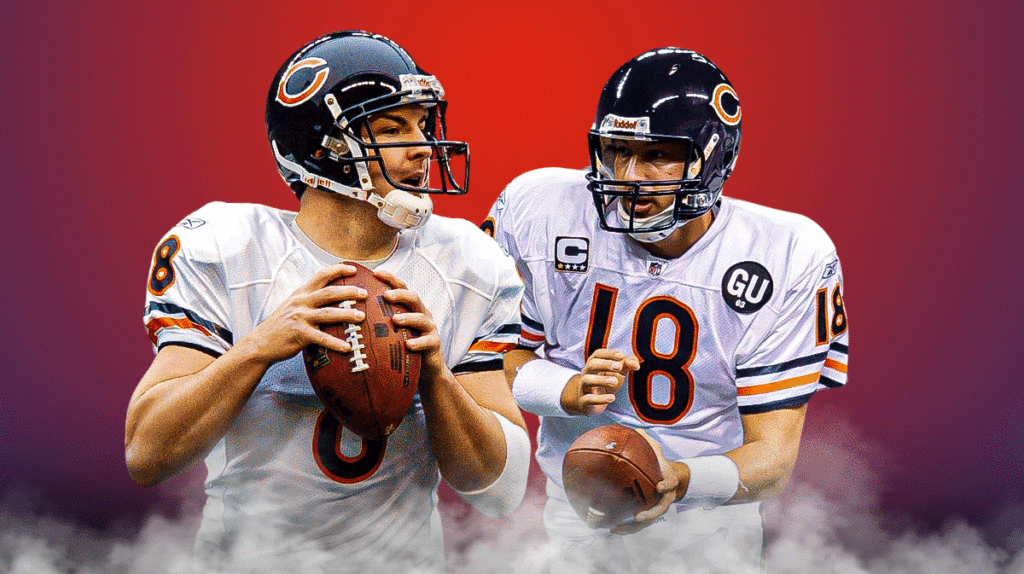
Rex Grossman – 2003-2008, 36 games, 6,164 passing yards (15th all-time), 33 touchdowns, 35 interceptions, 19-12 record as starter
Kyle Orton – 2005-2008, 33 games, 5,319 passing yards (18th all-time), 30 touchdowns, 27 interceptions, 21-12 record as starter
Had it been Jay Cutler, Mitchell Trubisky, Justin Fields, or maybe even Anatomically Average-Sized Nick — shit, you could even talk me into UFL washout Josh McCown for that matter — who was quarterbacking the Bears in '05 and '06, we would have a Super Bowl title in the 21st century. I'm fairly certain of that, and yes, I'll be using the pronoun “we” a little more regularly from here on out, because once the conversation about Bears quarterbacks gets to the point where Rex Grossman and Kyle Orton are up for discussion, that's where all objectivity officially goes out the window… not that there's been too much up to this point.
Were the 2005 and 2006 Chicago Bears perfect football teams? Of course they weren't. They were tremendously flawed, but still good enough to clinch byes into the NFC Divisional Round of the Playoffs. In fairness to both Orton and Grossman, all issues related to the offense shouldn't just fall on the shoulders of the quarterback. Run down the list of weapons that Orton and Grossman had at their disposal in the '05 and '06 seasons, and things get murky in a hurry:
2005: Muhsin Muhammad (64 receptions, 750 yards, 4 touchdowns), Justin Gage (31 receptions, 346 yards, 2 touchdowns), Bernard Berrian (13 receptions, 246 yards), Mark Bradley (18 receptions, 230 yards), Desmond Clark (24 receptions, 229 yards, 2 touchdowns)
2006: Muhsin Muhammad (60 receptions, 863 yards, 5 touchdowns), Bernard Berrian (51 receptions, 775 yards, 6 touchdowns), Desmond Clark (45 receptions, 626 yards, 6 touchdowns), Rashied Davis (22 receptions, 303 yards, 2 touchdowns), Mark Bradley (14 receptions, 282 yards, 3 touchdowns)
All I'm saying is you don't see Mark Bradley or Rashied Davis jerseys popping up at Soldier Field nowadays, but the same can be said for the two quarterbacks who were primarily responsible with getting Bradley, Davis, and the rest of the Bears underwhelming supporting cast the ball.
Nearly two decades later, I'll continue to favor Orton over Grossman, simply because you knew what you were getting from Kyle Orton. He was never going to lull you into thinking that he was anything more than a completely overmatched game manager who definitely couldn't win you a game, but probably wouldn't lose it for you either as long as you spotted him a lead, which our defense and running game was good enough to do on multiple occasions during the 2005 season.
(As a side note, this is one of the most Bearsy Bears stats in the long history of the Chicago Bears — after a 1-3 start to the season, the '05 Bears went on an eight-game winning streak, where they held opponents to 10 or fewer points in six of those eight games. During that eight game winning streak, Orton threw 7 touchdowns and 7 interceptions.)
Rex Grossman had just enough moments that allowed you to talk yourself into thinking maybe he was turning the corner — like the game-winning drive against Minnesota in Week 3, or his 339 yard and 3 touchdown performance in an overtime win over Tampa Bay in Week 15 — only for him to bring everyone back to earth with disastrous performances, like his 6 turnover dud against Arizona on Monday Night Football (better known as the “They are who we thought they were!” game), his 0.0 passer rating debacle against Green Bay in the regular season finale, or Super Bowl XLI, where Grossman's 3 turnovers (including a back-breaking pick six that extended the Colts lead to 12 in the 4th quarter) were a big reason why February 4th, 2007 did not go down as one of the best days of my life.
Category F – It's The Hope That Kills You
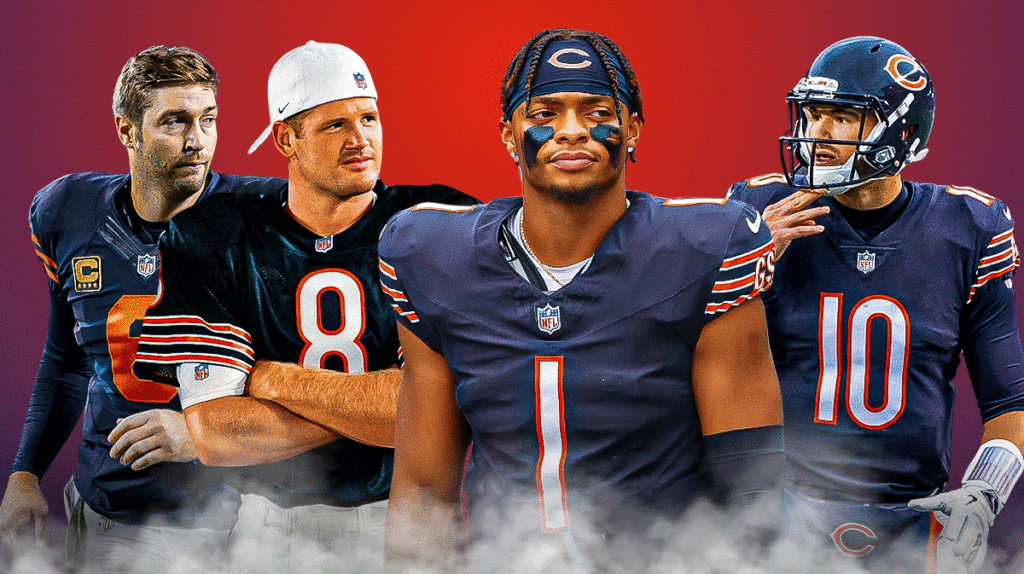
Cade McNown – 1999-2000, 25 games, 3,111 passing yards (25th all-time), 16 touchdowns, 19 interceptions, 3-12 record as starter
Cade McNown was the guy that non-Bears fans have painted Mitchell Trubisky to be, but any comparison between the two is completely unfair to Mitch. Cade McNown was selected 12th overall in the 1999 NFL Draft, the highest drafted quarterback by Chicago since they selected Jim McMahon with the 5th pick in 1982. At the time, it was viewed as a slam dunk pick. McNown set numerous UCLA records, led the Bruins to the Cotton Bowl and Rose Bowl in back to back seasons, and remains the only UCLA quarterback with a perfect 4-0 record over USC. Early returns from training camp indicated that McNown was equipped to be The Guy in The Chi.
“The Bears are looking for a savior,” wrote Sports Illustrated's Peter King back in August 1999. “Jordanless Chicago is looking for a champion. Is feisty rookie quarterback Cade McNown the man to lead the Bears and fans in the Windy City out of the fog? Early indications are that the kid has the charisma and the work ethic to get the job done.”
It didn't take long for all of that goodwill that McNown had built up while signing autographs for fans and staying late after practice to work with teammates to dissolve. Sure, McNown set Bears rookie records for single game passing yards (301) and touchdowns (4), but the rest of his short tenure in Chicago was a total mess. Things got so bad that halfway through the 2000 season, Bears fans began booing McNown and the offense so mercilessly that after one particularly rough home loss to the Detroit Lions — McNown threw three interceptions and had four fumbles — the second-year quarterback suggested that Bears fans should stay home and boo their TV sets if they weren't going to cheer for the team. I don't think you need me to tell you how that went over.
Needless to say, Cade McNown was not the man to lead the Bears and the fans in the Windy City out of the fog. If anything, McNown was a whiteout blizzard rolling in off of Lake Michigan that pushed the franchise further away from the promised land than we were prior to his arrival in Chicago.
Jay Cutler – 2009-2016, 102 games, 23,443 passing yards (1st all-time), 154 touchdowns, 109 interceptions, 51-51 record as starter
Unlike the other three quarterbacks in this category, Jay Cutler was not a homegrown product. It took Kyle Orton, a 1st round pick and a 3rd round pick to acquire Cutler from the Broncos after Cutler had gone 17-20 during three seasons as Denver's starting quarterback.
Jay Cutler was a far different kind of quarterback than we were used to. He was reckless enough that he could sure as hell lose you a game, but talented enough that he could almost single-handedly win you a game too. The gunslinger mentality was something we had seen up close and personal from Green Bay Packers quarterback Brett Favre for years, and the Bears had been on both the winning and losing side of it. Life with Jay Cutler would not be much different for us.
During his first season in Chicago, Cutler led the league with 26 interceptions. You want the upside of someone who was gonna sling the pigskin all over the field, you had to live with the downside too. In 2010, Cutler was sacked more than any QB in the league, which was a product of an iffy offensive line and Cutler's willingness to hold on to the ball for longer than he should. Even still, the Bears won the NFC North in 2010, clinched a 1st round bye, and advanced to the NFC Championship Game. We already covered the grisly details of what happened on the field against the Packers in the Caleb Hanie section. But what happened off the field is what has come to define Jay Cutler's legacy with the Bears.
Cutler exited the game early in the 3rd quarter with what turned out to be an MCL sprain, but at the time, it wasn't completely clear why the Bears turned first to Todd Collins, and then to Caleb Hanie. We knew Cutler was injured, but there was no indication of how significant the injury was and the Bears didn't provide any information on Cutler's condition until the next day. As a result of both the in-game situation and the fact that by 2010 sports fans and other athletes were living on Twitter and offering instant reactions, Cutler became the target of a social media attack from both fans and fellow NFL players. His toughness, commitment, and competitive fire were all called into question as the Packers were closing in on their fifth NFC title.
Was the target on Cutler's back bigger because of his brazen style of play, his prickly nature, and a face that, at least in my opinion, bares resemblance to the often-villainous Edward Norton? Of course he was, and FOX color commentator (and three-time Super Bowl champion) Troy Aikman said as much. It made no difference that after the game Lovie Smith shared that the decision was his, not Cutler's. Nor did it matter that both Bears and Packers players came to Cutler's defense after the game. The damage had already been done.
Cutler would remain the starting quarterback of the Bears until 2016, but Chicago never made it back to the postseason. As the Bears offense under Cutler began to find its form in 2012, that's when the Brian Urlacher, Lance Briggs, Charles Tillman led defenses had aged and fallen off. In 2013, the Bears were the 2nd highest scoring team in the league, but 30th in points allowed. The two eras just never synced up.
Had there been some overlap, even by just a single year, it's possible that the 2010 NFC Championship Game would be nothing more than a minor footnote of Jay Cutler's career. Instead, it's come to be the defining story of his time in Chicago.
Mitchell Trubisky – 2017-2020, 51 games, 10,609 passing yards (5th all-time), 64 touchdowns, 37 interceptions, 29-21 record as starter
I bet you didn't expect this section to be devoted to defending Mitchell Trubisky, but let me tell ya, when you spend 5,000 words writing and thinking about the Chris Chandler's, Mike Glennon's, and Jonathan Quinn's of the world, Maserati Mitch starts to look as intriguing as he must've looked to former Bears GM Ryan Pace ahead of the 2017 NFL Draft. Pace sent the #3 pick, two 3rd rounders and a 4th round pick to San Francisco in order to move up one spot to #2 in order to select Trubisky, who only started 13 games at North Carolina and wasn't even the best quarterback in the ACC.
Three years later, after Trubisky had failed to live up to #2 pick standards — or maybe more appropriately, the standard set by Patrick Mahomes, who the Kansas City Chiefs selected eight picks after Trubisky — the Bears declined to pick up Trubisky's fifth year option ahead of the 2020 season, and less than one year later, he was out of Chicago. But as I already alluded to, I'm actually prepared to go to bat for Mitchell Trubisky.
(Lord help me.)
Let's start here… Mitch Trubisky's rookie year was the only one of his four seasons in Chicago in which he finished the year with a losing record as the Bears starting quarterback, and we can't just ignore the fact that it was John Fox who was coaching Chicago in 2017, and Fox was even more washed than Chris Chandler was when he was quarterbacking the Bears. Take away his 4-8 rookie season, and Mitch's record as the Bears starting quarterback is 25-13.
Trubisky lacked the consistency of the top tier of quarterbacks in the league, often missing on throws that a legitimate starting quarterback in the NFL just can't afford to miss. But Mitch also had the ability to turn look like a superstar, like he did in a six touchdown performance against Tampa Bay. He could also routinely turn nothing into something, make off-schedule throws and keep plays alive using his legs. Josh Allen, Lamar Jackson, Cam Newton and Deshaun Watson were the only quarterbacks who rushed for more 1st downs than Trubisky during the 2018 season, which was by far the best of his career. It just so happens that the 2018 season doubles as my single favorite season as a fan of the Chicago Bears.
It's not an exaggeration to say that I think about the 2018 Bears at least three or four times a week. Without doing any sort of research, I can tell you about each of their five losses (four in the regular season, one in the postseason) which came by a total of only 16 points. Two came in overtime, one on a 75-yard touchdown pass from Aaron Rodgers to Randall Cobb with just over two minutes to go, one after a completed Hail Mary that came up just one yard short of the end zone that could've tied the game, and one on that f***ing Double-Doink that still makes me sick to my stomach when I think about it. And here's the thing: People forget that Mitchell Trubisky had to lead the Bears into field goal range late in the 4th quarter just to give Cody Parkey a shot at that field goal.
Down by a point with under 1 minute to go, the Bears got the ball back after surrendering a go-ahead touchdown pass from Nick Foles — who at that point still oozed a bit of Big Nick Energy from time to time — to Golden Tate. Trubisky completed a 25 yard pass to Allen Robinson to get things started, and followed that up with an eight-yard completion to Robinson to get the Bears set up at the 25-yard-line with 10 seconds left. You all know what happens next.
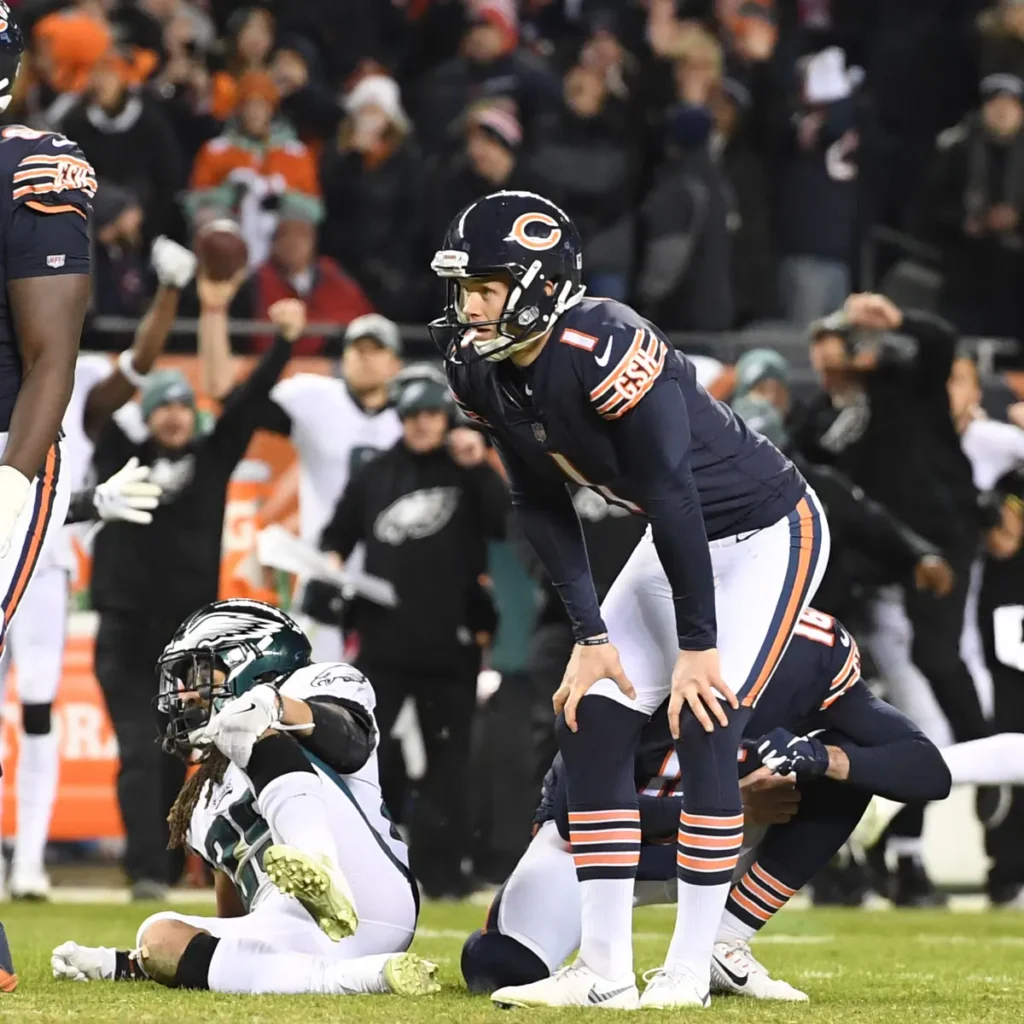
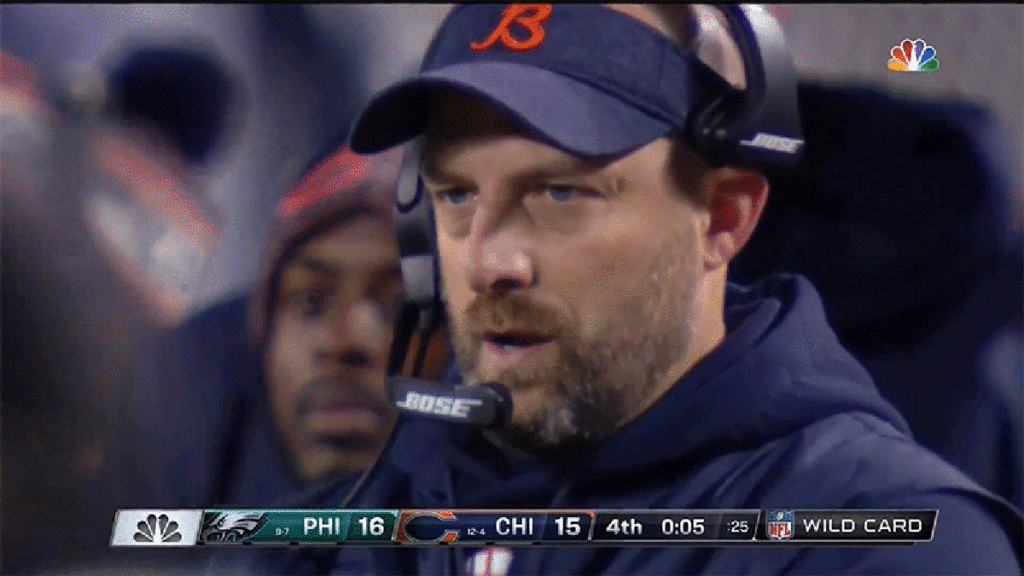
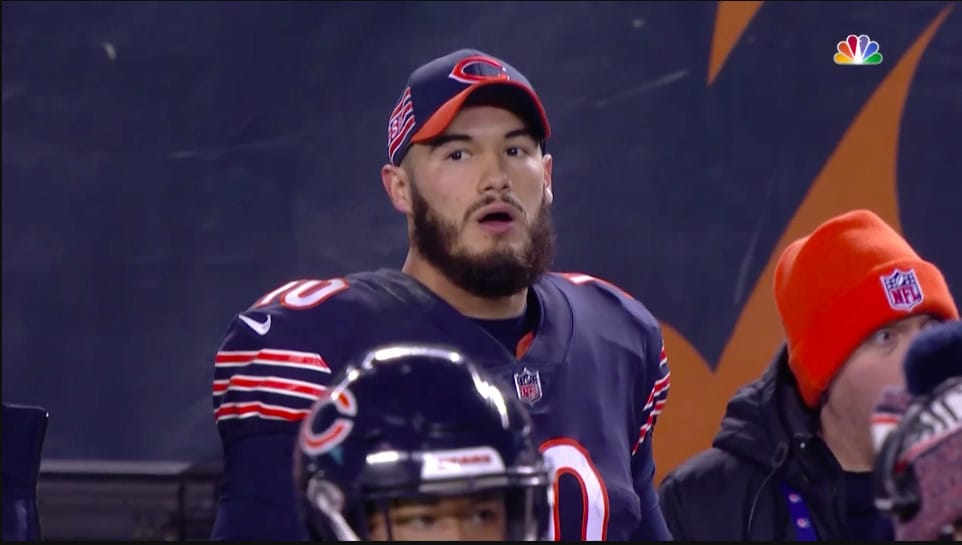
Mitchell Trubisky wasn't the franchise quarterback that the Bears hoped he would be, but he was a far better option than guys like Rex Grossman, Kyle Orton and Jim Miller ever were. The Bears didn't lose in 2018 because of him. They lost because of the right leg of Cody Parkey and two unfortunate bounces of the football off of aluminum posts. I'll go to my deathbed believing that Mitchell Trubisky and the 2018 Bears not only could've, but should've won the Super Bowl. You cannot convince me otherwise.
Justin Fields – 2021-2023, 40 games, 6,674 passing yards (10th all-time), 40 touchdowns, 30 interceptions, 10-28 record as starter
All I can say is this: I still wish things had turned out differently with Justin Fields. Moving on.
Category G – The Second City Savior
Caleb Williams – To Be Determined
I don't give a damn if Caleb Williams paints his fingernails with pink nail polish, rolls up to Soldier Field on game days in a Pink Escalade, or if he wears a pink headband with “Goodell” written across it in glittery letters like he's some sort of bedazzled, Gen Z Jim McMahon… if this is the guy who puts an end to the Bears Quarterback Curse and brings another Lombardi Trophy to the Windy City, he'll be a Chicago sports legend forever.
That's all Bears fans care about. Or at the very least, that's all that this Bears fan cares about.

